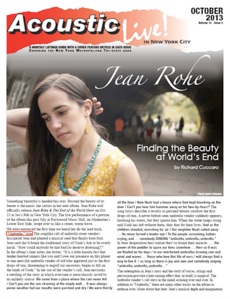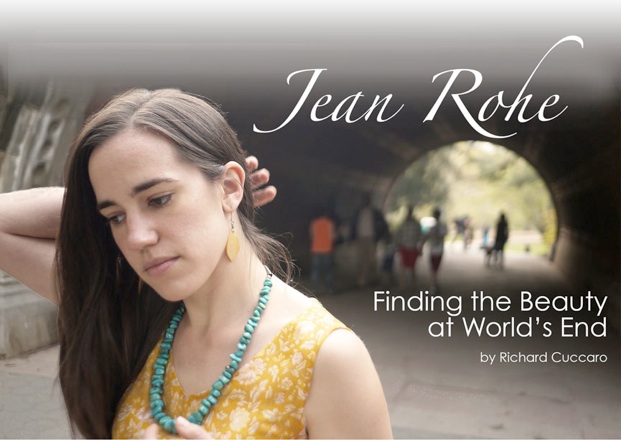
Something beautiful is headed this way. Beyond the beauty of its bearer is the music she carries in her new album. Jean Rohe will officially release Jean Rohe & The End of the World Show on Oct. 22 at Joe’s Pub in New York City. The live performance of a portion of the album this past July at Rockwood Music Hall, on Manhattan’s Lower East Side, swept over us like a sweet, warm wave.
We were entranced the first time we heard her do the lead track, “Umbrella,” live. The songlike call of umbrella street vendors fascinated Jean and planted a musical seed that finally bore fruit. Jean said she’d found the traditional story of Noah’s Ark to be overly harsh: “How could anybody be that bad [to deserve drowning]?” In the album’s liner notes she writes: “It is a little-known fact that tender-hearted sinners like you and I owe our presence on this planet to one merciful umbrella vendor of old who appeared just as the first drops of rain, threatening to engulf our ancestors, began to fall on the lands of Noah.” In her use of the vendor’s call, Jean envisions a retelling of the story in which everyone is miraculously saved by an unlikely source: We come from a place where the rain never fell / Can’t you see the sun straining at the empty well… It was always picnic weather but our mouths were parched and dry / We were thirsty all the time / Now Noah had a house where God kept knocking on the door / Can’t you hear him hammer away on his two-by-fours? The song lyrics describe a revelry as parched throats swallow the first drops of rain. A never-before-seen umbrella vendor suddenly appears, hawking his wares, but they ignore him. When the water keeps rising and Noah has left without them, they fear for their lives: And as the children shouted, searching for air / Our neighbor Noah sailed away … He never turned a tender eye / To the people screaming, babies crying, and … somebody singing “umbrella, umbrella, umbrella.” In their desperation they realize they’ve found their miracle: … the power of the peddler to spare our lives somehow … then so it was we floated on for days / in our overturned umbrellas braving rain and wind and waves … those who love this life of ours / will always find a way to live it / as long as there is joy and awe and somebody singing “umbrella, umbrella, umbrella…”
The redemption in Jean’s story and the swirl of voices, strings and percussion provoke a hair-raising effect that, in itself, is magical. The umbrella vendor’s call stays in the mind, echoing over and over. In addition to “Umbrella,” there are many other tracks on the album to enthuse over. More about that later. Jean’s musical depth and imagination have roots that delve deep into childhood, as a recent interview revealed.
Beginnings
Jean Rohe was born in Paterson, N.J., and grew up mostly in nearby Nutley. She has a brother three years younger, and her parents gave her a lot of independence while growing up.
Her mother is a nurse. Her father, she said, is a professional storyteller. He had been a truck/limo driver and a short-order cook, but lost his job when she was young. So he stayed home much of the time and read to her a lot. She recalled that he read Steinbeck to her while she was in high school. “I was so spoiled,” she said.
Both parents were musically inclined and they formed a family band, performing mostly in folk venues. Jean was 7 or 8 when they had their first family gig. Her father played guitar and everyone sang. Jean’s brother provided comic relief, using noisemakers and puppets. One non-folk venue proved to have a lasting effect on her. This was a steady gig at the New York Aquarium at Coney Island. The family band would play for people as they exited the outdoor show, singing environmentally conscious songs about the sea and its creatures, like “Baby Beluga,” among others. Jean and her brother were 10 and 7 respectively around this time. On occasion, they got to pet the beluga whale on its tongue (it opened its mouth for this). Jean still marvels at the memory.
They had a lot of magical moments with wildlife in their childhood even in the urban world, she said. She believes that it sparked an ability to see beyond what’s on the surface in her daily life. Jean told me she feels a bond with nature and has always felt herself to be an outdoor person in spite of having lived an urban lifestyle. The family band gigs ended when Jean was around 16. Her brother’s interest drifted, Jean left high school for college and the band just “petered out.”
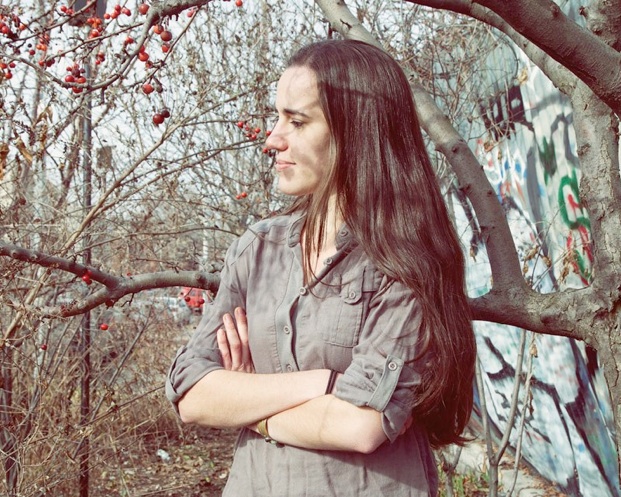
High School Whirl
Overall, high school was, to put it mildly, an uncomfortable experience. Jean was always looking for a way out. In spite of this, or maybe because of it, she was a very busy high schooler. Jean had gotten a guitar when she was 15, but didn’t play it much. She studied with a great piano teacher, jazz pianist and composer Diane Moser, during high school. “The theoretical knowledge that came from those piano lessons has been important to me,” she said.
She sang in high school chorus, while allowing that it was frustrating because it was not well-run. There were higher goals, such as participating in the North Jersey and All State competitive choruses. She played French horn in the orchestra and the straight-bell mellophone in the marching band. She was in some musical plays, but switched to strictly performing as part of the orchestra.
Another important formative experience during this time was the period spent with a group of girls who, without adult supervision, formed an a cappella group called Accent. Several very intelligent and talented students who started the group invited Jean to join them. Throughout grades eight to 11, Jean performed with Accent at libraries, senior homes,in talent shows and once at Merkin Hall in Lincoln Center, as part of a multi-group show. Her time with the group lasted about three years.
An auspicious development for Jean during this period was meeting her present life (and band) partner, guitarist Ilusha Tsinadze, when she was 16. “He was one of my first dear musical collaborators when we met. We got into jazz standards and some of the classic American songwriters and just learned a lot by playing music together during those formative years,” she said.
The independence granted by her parents now manifested itself. When Jean found out a number of colleges, many of them Ivy League, accepted applicants without a high school diploma, her path was set.
Out in the World
Jean dropped out of high school when she was in her junior year, was accepted at and went to Smith College in Northampton, Mass. She arrived at Smith in September 2001, less than a week before the 9/11 World Trade Center tragedy. Experiencing her first real time away from her parents, Jean was thrown into the post-9/11 world of paranoia and politics. While she had longed to escape from the cocoon of home and high school, it was hard getting used to being surrounded by opinionated strangers and away from familiar surroundings.
Although she only stayed at Smith for a year, she described her experience in glowing terms, citing financial help received and the enjoyment of academic pursuits. She studied international relations, Spanish literature, music theory and Western classics. Musically, she got into Brazilian percussion, sang in an a cappella group and was a guest vocalist in a jazz group.
After attending Smith, Jean expanded her horizons yet again. Prior to a Bush administration U.S. travel ban, she went to Cuba and studied in a one-month program dealing with Spanish/Cuban history and politics. Spurred by an interest in the music and culture, she returned several times.
Back in the Big Apple
Leaving Smith after that year, Jean transferred to The New School of Jazz and Contemporary Music program in New York City. She moved back in with her parents and commuted to school from New Jersey. Aside from a short-lived waitressing job, Jean found steady employment in the field of music and has never done anything else.
The first job came her way when she read a neatly penned bulletin-board ad from children’s musician Lou Gallo — now a long-time collaborator — who needed a replacement for a partner who’d moved away. In the job description, Jean saw something very familiar to what she’d done in the family band. She thought, “I can totally do this.” During their initial get-together, in which they met and played children’s songs, Jean actually taught Lou songs that she knew from childhood. They clicked immediately and worked every week, playing in public parks and at children’s parties. Additionally, Jean taught a weekly music class with Lou one morning a week at a Manhattan YMCA.
She graduated in 2006 with a BFA in Jazz Vocal Performance from The New School University and a B.A. in Cultural Studies from Eugene Lang College, the undergraduate liberal arts college at The New School.
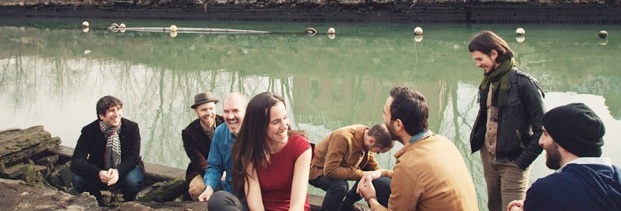
The Teacher
The Third Street Music School Settlement (actually on East 11th Street) in Manhattan ran a Music In the Lower East Side (MILES) program. In 2004, through that program, Jean began teaching sporadic music classes to pre-kindergarten to third-grade students at Lower East Side public schools. By 2010, four years after graduation, her workload had increased to three full days of classes. Some days after school, she’d head down to Battery Park City, where a group of seven or eight sets of parents banded together to hire her to teach late afternoon music classes to their pre-K children.
Brazilian Connection
Throughout her childhood and then in college, Jean had listened to Brazilian music which is a strong component of jazz. On her own, while at The New School, she studied singing in Portuguese from records using a phonetic technique. She became more fluent by meeting Brazilian musicians in school and within the New York City community. She sang with them, sometimes in ethnic restaurants featuring music. Later, a number of the musicians Jean had sung with moved back home. In 2007, Jean went to Brazil to visit them. There she discovered the layers within the culture which make Brazilian music such a communal force. In her study of jazz, she found an existing etiquette that tends to dictate how players interact with each other. In Brazil, she said, “everybody would just dive in, singing or dancing. It was a spirit I wanted to carry with me in the music I was making.”
Professional Jump
In 2008, she released her first CD, Lead Me Home, in which she documented her growth as a musician and her concern for the welfare of the world at large. It captured some of her experiences in Brazil and drew upon the participatory energy she’d grown to love. In 2010, she attended the Northeast Regional Folk Alliance (NERFA) Conference for the first time with her trio and came back in 2011. We reviewed Lead Me Home in our 2011 NERFA wrap-up issue: Jean lends her light, refined voice to songs sung in English and Portuguese. She combines Brazilian-flavored songs with social consciousness, creating a global mindset. In the sad “What Will We Tell Our Children,” her silken voice asks, Suffering on the other side of the sea / am I a citizen, what is my responsibility? / What will we tell our children when they ask what did you do?”
By 2010, it was apparent that Jean needed to make a choice. The mix of teaching and performing was draining her. She began to see herself more as an artist and realized she would need to leave teaching and become a full-time professional musician to really fulfill her life’s goals.
Jean had always fought the idea of being a female singer/songwriter, “a woman with a guitar” — she’d seen a lot of bad imitators (haven’t we all?) — but she’d been writing from an early age, so it was a natural progression. Her musical ideas are complex, though, and fit more readily in a context with other musicians from a duo to full band.
Jean had attended NERFA with guitarist Ilusha Tsinadze and accordionist Liam Robinson, a longtime musical partner who had released a CD of traditional folk music with her, Robinson & Rohe. Their music was greeted with great enthusiasm. However, the success at NERFA was bittersweet for Jean. In 2011, Liam had been cast in the Lincoln Center’s Broadway production of War Horse and was preparing to leave for a year. Jean had gotten many gig opportunities from presenters. To keep things moving, she called her friend, violinist Skye Steele. Ilusha continued on guitar and Jean played mandolin, and the trio carried on.
After a year, Liam had finished with War Horse and Jean was ready to record a new album. She got in touch with Liam who agreed to help with the new recording and essentially acted as a producer. She also called musicians from other projects and assembled a group of around eight players as the core ensemble.
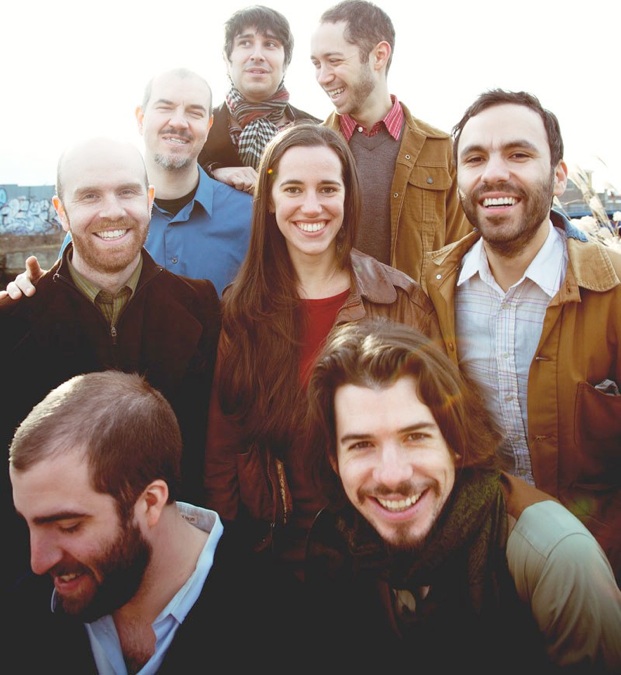
Photo: Jen Painter
The New Album
End of the World Show is indeed a work of art. In addition to the ecstatic “Umbrella,” I find that the bilingual song “La Coqueta” has some of the same instrumental uplift as “Umbrella.” The song “Pacific Street,” with Jean on guitar and plus a string trio (violin-Skye Steele, viola-Ljova Zhurbin, cello-Dave Eggar, arranged by Liam Robinson), is especially beautiful. Jean was awakened at 3 a.m. by a person’s voice singing outside on the mostly quiet (at that hour) Pacific Street in Brooklyn. “It was a gorgeous, ethereal melody, sung over and over.” she said. Jean woke up the next morning and was able to recapture it. Months later “it found its way into a song,” she said. “Pacific Street” begins with her humming the recalled melody, then it gently unfolds into a description of typical nighttime revelers, the event itself and its eventual effect on her: Some people like their alcohol, they drink too much / and then they call their gods / as they walk down Pacific Street / they stop beneath your window where / they laugh too loud and then they pull their hair in anguish / ’cause the world has made them weak / but mysteriously last night / through the window came a street lamp light and with it came a singing voice so sweet / the moon, the stars, the autumn air, some other drug, I don’t know or care / but there she was, she sang angelically…
The song “New Year,” with its call and response of it shall be, continues to crescendo and builds to an inspiring finish. The album employs a final crescendo with the last track “O Bright Star.” Amid her observations about life, both within and outside her, Jean sings: There’s a slick of oil on the ocean, / there’s a war ablaze overseas / There is a tide that’s tugging my body down. The chorus blazes with hope: O bright city! O bright star! / I cry for water to heal my heart / Down, bright bucket! Down, deep well! / Arms don’t fail me, can we pull it up full?
One song, the hugely inspiring “National Anthem: Arise! Arise!” was part of the recording project but wasn’t included on the album. Our monthly pdf and website feature page will provide a link to a full orchestra performance video of the song on YouTube.
WFUV DJ John Platt has said, “There are plenty of talented artists out there but what sets Jean Rohe apart are the suppleness of her voice, the integrity of her vision and the grace she shows in her wide-ranging journey across the musical landscape.” I can’t say it any better. Jean’s music gives me goose bumps on a regular basis. Acoustic Live invites its readers to experience the same feeling. See her live and buy her CDs. You can’t go wrong.
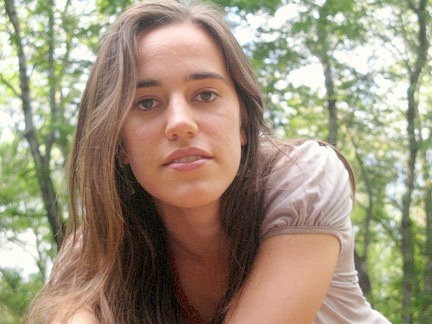
Photo: Ilusha Tsinadze
Website: jeanrohe.com
Upcoming Performances:
Oct 1 7:30pm, The Rock Shop, Brooklyn, NY (solo)
11-13 Folk Project Fall Festival, Hackettstown, NJ Show Times TBA
22 9:30pm Joe’s Pub, NYC Record Release Show****
Nov 8-11 Northeast Regional Folk Alliance Conference,
Kerhonksen, NY
Formal Showcase Saturday 7:30pm,
Acoustic Live late Saturday guerrilla showcase (1:45am)
23 6pm Puffin Cultural Forum, Teaneck, NJ

